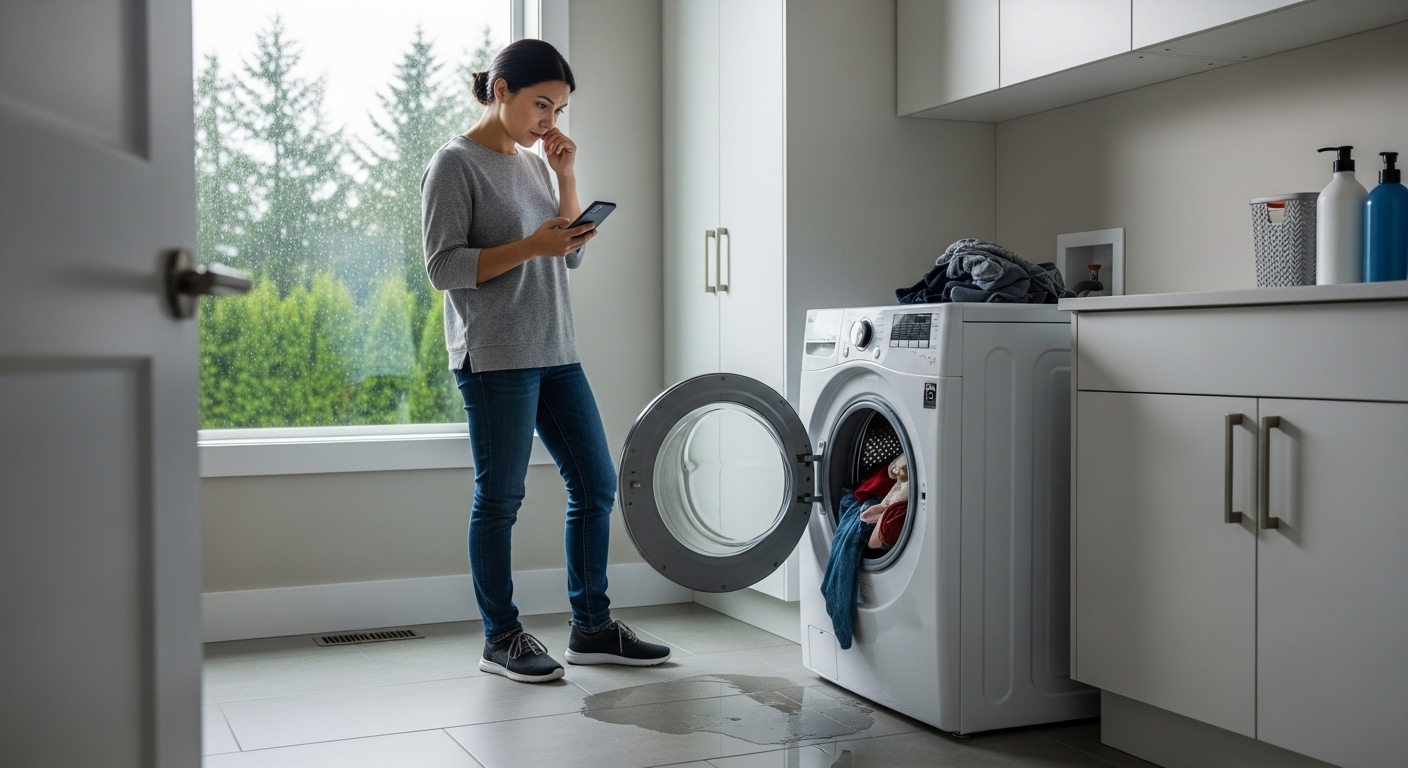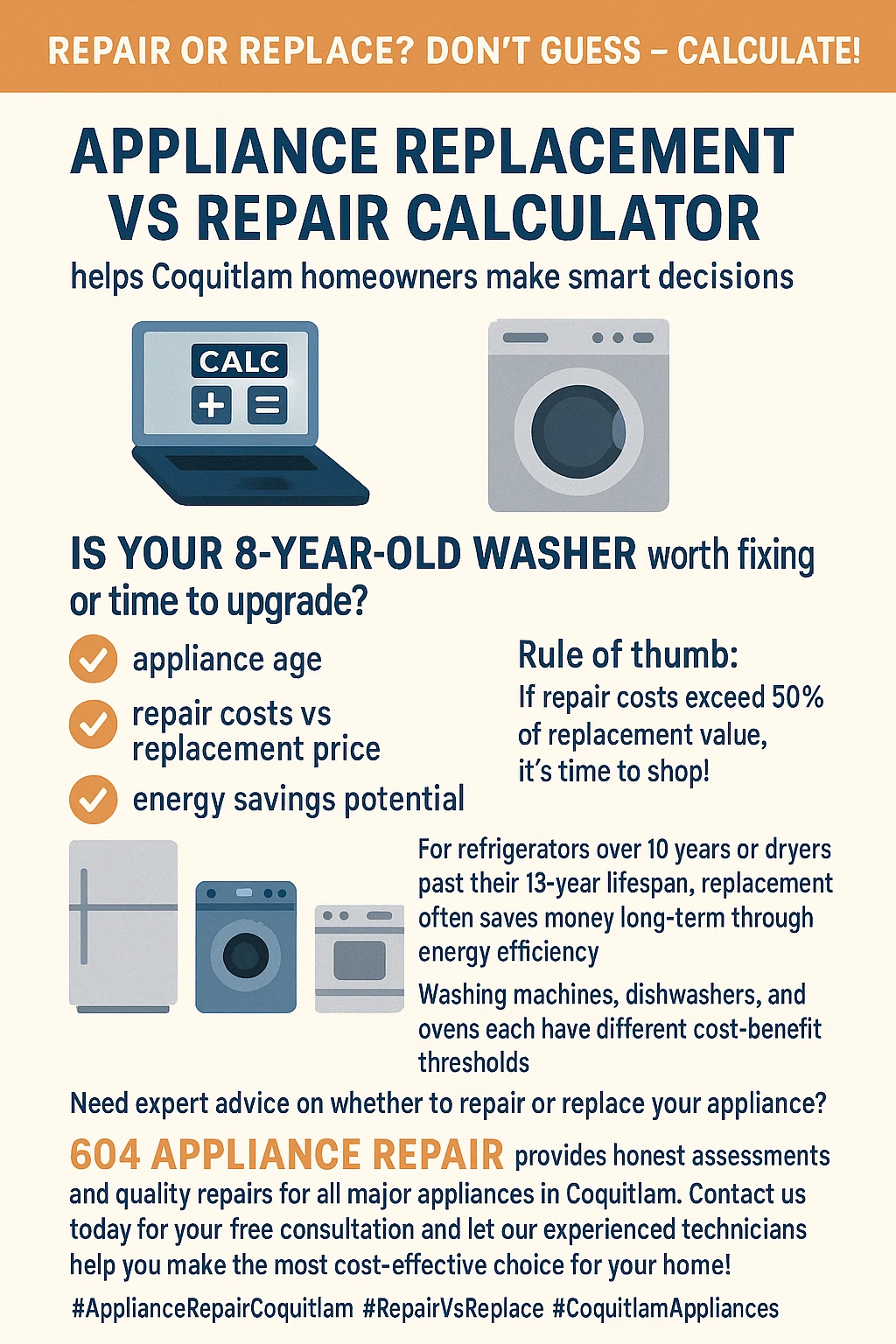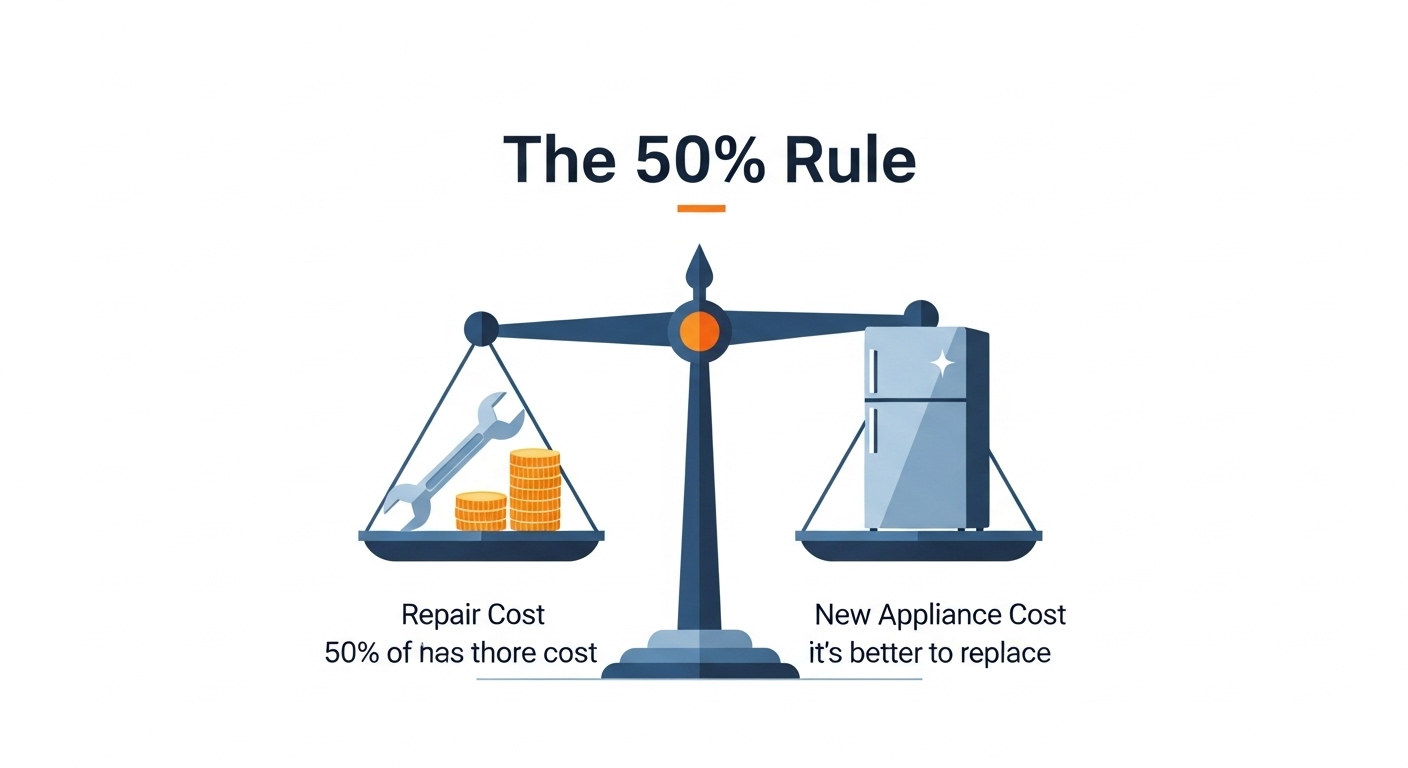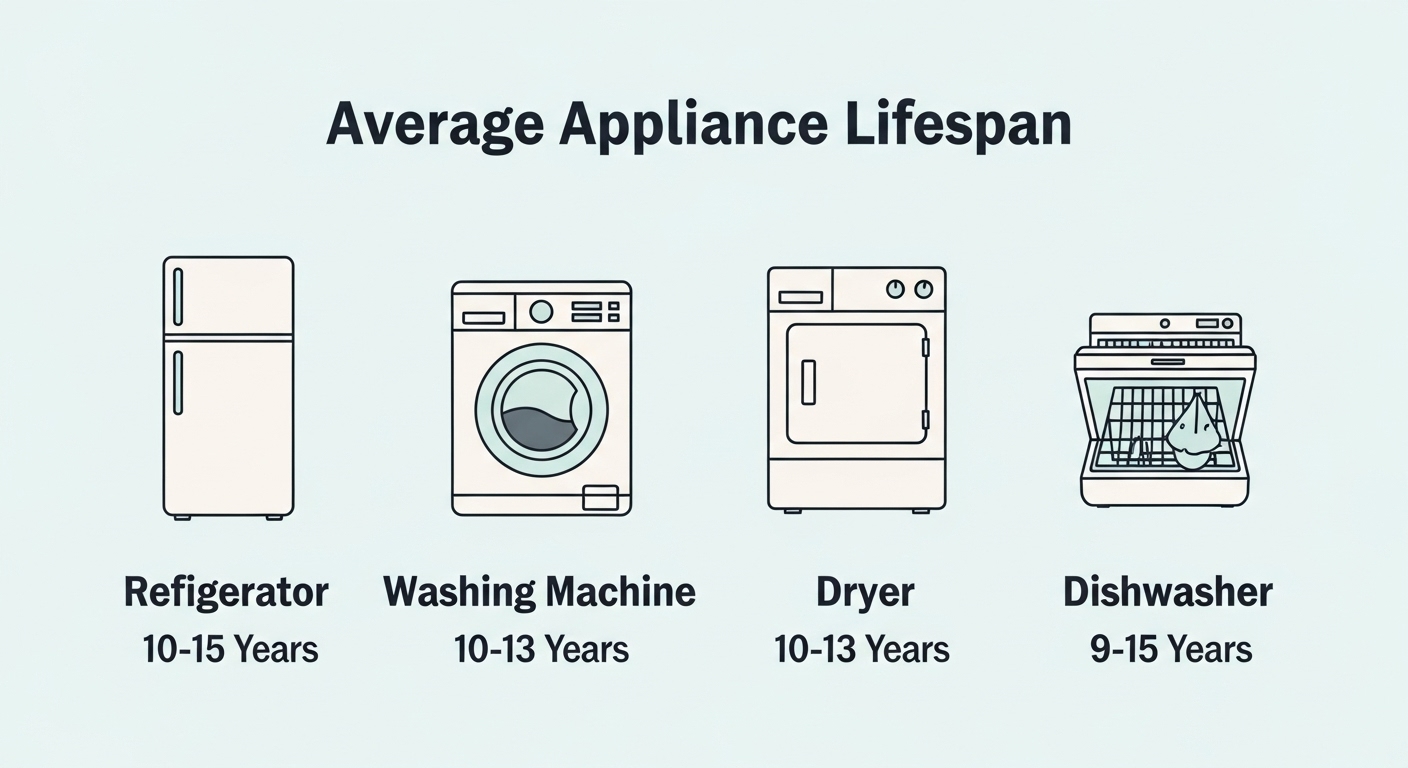The Appliance Replacement vs Repair Calculator: When Coquitlam Homeowners Should Fix vs Replace Based on Age, Cost, and Energy Savings
Dealing with a broken dishwasher that won’t drain or a refrigerator that’s making mysterious noises? You’re not alone – thousands of Coquitlam homeowners face the same tough decision every year: should you repair that aging appliance or bite the bullet and replace it entirely?
Picture this: it’s a busy Tuesday morning, you’re rushing to get the kids ready for school, and your washing machine decides to give up mid-cycle, leaving you with a soggy mess and a major headache. Your first instinct might be to call for repairs, but what if I told you that decision could cost you hundreds – or even thousands – more than necessary? The truth is, there’s actually a science to making this choice, and it’s way more straightforward than you might think.

As someone who’s been in the home improvement game for years, I’ve seen too many homeowners make emotional decisions about their appliances that end up costing them big time. Maybe they get attached to that vintage stove (I get it, the nostalgia is real), or they panic and rush into buying the first shiny new model they see. But here’s the thing – with the right framework and a little bit of number crunching, you can make a smart, data-driven decision that’ll save your wallet and your sanity.
The good news? You don’t need to be a math whiz or an appliance expert to figure this out. There are some tried-and-true rules and calculations that take all the guesswork out of the equation. From the famous “50% rule” to energy efficiency calculations, we’re going to break down everything you need to know to make the smartest choice for your Coquitlam home.
Key Outtakes
- The 50% rule states that if repair costs exceed half the replacement price, replacement is typically more economical for your household budget
- Appliances over 10 years old with major repairs usually favor replacement due to declining efficiency and reliability, especially in Coquitlam’s variable climate
- Energy savings from newer ENERGY STAR appliances can offset replacement costs within 2-3 years through reduced BC Hydro bills
- Built-in appliances in Coquitlam homes may justify higher repair costs due to custom sizing and complex installation requirements
- Local utility rebates and BC Hydro programs can reduce replacement costs by $150-$500 for qualifying energy-efficient appliances

Understanding the Appliance Repair vs Replacement Calculator Framework
Let me start with the golden rule that’s saved me from countless headaches over the years – the 50% rule. This isn’t some random number I pulled out of thin air; it’s the industry standard that professional technicians and smart homeowners swear by. Here’s how it works: if your repair costs are going to exceed 50% of what it would cost to replace the appliance entirely, you’re better off buying new.

Think of it like this – if your 8-year-old dishwasher needs a $400 repair, but you can buy a comparable new model for $700, you’re looking at paying 57% of the replacement cost just to fix the old one. That’s a red flag right there. You’d be spending more than half the price of a brand new appliance on something that’s already showing signs of age and could break down again next year. The math just doesn’t add up, and your future self will thank you for choosing replacement.
Now, I know what you’re thinking – “But what if my appliance is practically brand new?” Great question! The 50% rule becomes even more powerful when you factor in age. For appliances under 5 years old, repairs almost always make sense because you’re dealing with a machine that’s barely broken in. But once you hit that 10-year mark, some experts recommend lowering the threshold to 30% instead of 50%. Why? Because older appliances are just more likely to have cascading failures, where fixing one problem leads to discovering three more.
The beauty of this framework is that it takes emotion completely out of the equation. No more “but I love this old refrigerator” or “this washing machine has sentimental value.” Numbers don’t lie, and they definitely don’t care about your feelings toward your appliances. When you’re looking at spending $300 to repair a 12-year-old dryer that you could replace for $600, the calculator is telling you loud and clear what the smart move is.
But here’s where it gets interesting for us Coquitlam folks – our local market has some unique quirks that can influence these calculations. Labor rates in the Greater Vancouver area tend to be higher than national averages, with service calls typically running $70-$130 just to get a technician through your door. That diagnostic fee usually includes the first hour of work, but additional labor can cost anywhere from $50-$150 per hour. These higher local costs actually make the 50% rule even more relevant for our area, because repair bills add up faster than in other markets.
Coquitlam Appliance Age and Condition: When Time Matters More Than Sentiment
Age isn’t just a number when it comes to appliances – it’s actually your most reliable predictor of future problems and a crucial factor in your repair-versus-replace decision. After years of helping homeowners navigate these choices, I’ve learned that understanding typical appliance lifespans can save you from throwing good money after bad.
Let’s talk real numbers here. Your average refrigerator is going to give you somewhere between 10-15 solid years of service, with single-door models often pushing closer to 17 years if you treat them right. Washing machines and dryers typically tap out around the 10-13 year mark, while dishwashers fall somewhere in the 9-15 year range. These aren’t just random estimates – they’re based on actual failure patterns and manufacturer data that I’ve seen play out in homes across Coquitlam.

Here’s something most people don’t realize: not all appliances age the same way, even within the same category. Side-by-side refrigerators, for instance, tend to become economically unfavorable to repair after about 8 years, while bottom-freezer models hit that sweet spot around 7 years. Top-freezer refrigerators, the workhorses of the appliance world, should generally be replaced after 7 years – not because they’re necessarily broken, but because the energy efficiency improvements in newer models are so significant that you’re literally paying extra every month to keep the old one running.
But age alone doesn’t tell the whole story. I’ve seen 15-year-old appliances that run like champs because their owners stayed on top of maintenance, and I’ve encountered 5-year-old units that were basically held together with hope and duct tape because they were neglected or abused. The key is looking at both chronological age and what I call “functional age” – how hard has this appliance actually been working?
In busy Coquitlam households, appliances often work overtime. Large families, frequent entertainers, or households that do a lot of cooking and laundry can age their appliances faster than the standard timelines suggest. If your washing machine has been handling 10+ loads per week for the past 8 years, it’s functionally older than a machine that’s been doing 4 loads per week for the same period. This is why understanding usage patterns helps determine replacement timing for your specific situation.
The other factor that many Coquitlam homeowners overlook is our local climate’s impact on appliance longevity. Our wet winters and occasional temperature swings can be harder on appliances than you might think. Humidity affects everything from control panels to internal components, while temperature fluctuations can stress seals and gaskets. I’ve noticed that appliances in basement laundry rooms or unheated garages tend to age faster than those in climate-controlled areas of the home.
Safety becomes a major concern as appliances age, especially gas-powered units. Once you start seeing issues like faulty wiring, gas leaks, or inconsistent temperatures that could affect food safety, age becomes irrelevant – you’re looking at immediate replacement territory. I’ve learned that when safety is on the line, the repair-versus-replace calculator becomes pretty simple: replace, period.
Breaking Down Real Repair Costs in the Coquitlam Market
Now let’s get into the nitty-gritty of what repairs actually cost around here, because understanding local pricing is crucial for making smart decisions with your repair-versus-replace calculator. I’ve been tracking these costs for years, and there
